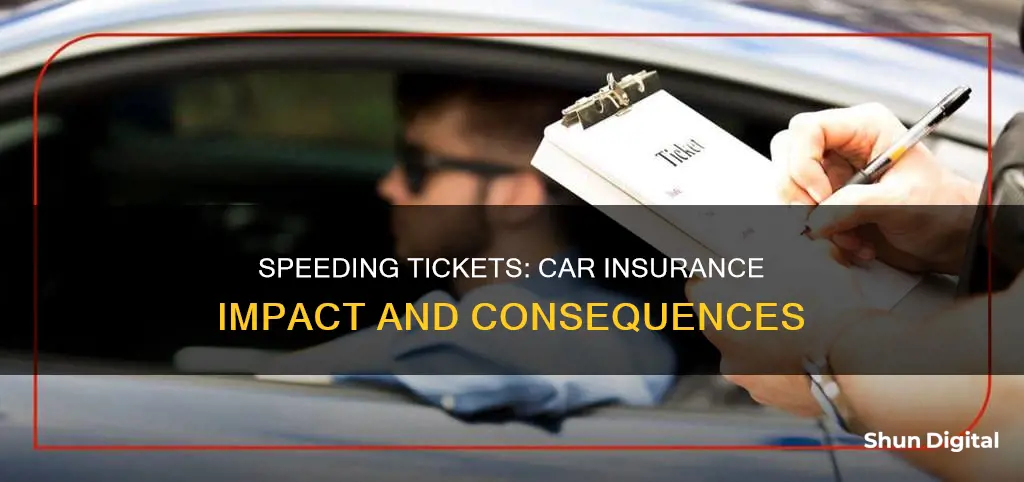
Getting a speeding ticket can be a frustrating experience for any driver, and it's natural to worry about the financial implications, especially regarding insurance rates. In most states, camera speeding tickets are treated as non-moving violations, similar to parking tickets, and therefore do not directly impact insurance rates. However, there are exceptions, and it's essential to understand how speeding tickets can affect insurance premiums and what steps drivers can take to mitigate potential increases.
| Characteristics | Values |
|---|---|
| Do camera speeding tickets affect insurance rates? | In most states, camera speeding tickets do not affect insurance rates. |
| How are camera speeding tickets treated? | Camera speeding tickets are usually treated as non-moving violations, similar to parking tickets. |
| What happens if you get a camera speeding ticket? | You will have to pay a fine. If you don't pay the fine, some cities may block your vehicle registration renewal. |
| Do camera speeding tickets go on your driving record? | Camera speeding tickets usually don't go on your driving record, but there are exceptions. For example, in Arizona, California, and Oregon, camera speeding tickets are treated as regular moving violations and can result in points on your license. |
| How much do camera speeding tickets cost? | The cost of camera speeding tickets can vary depending on the location and the severity of speeding. Fines can range from $0 to $500 or more. |
| How do insurance companies determine rates? | Insurance companies consider various factors when calculating rates, including driving history, credit score, age, gender, and more. Speeding fines can also impact insurance rates. |
What You'll Learn
- Speeding tickets are treated as non-moving violations in most states, similar to parking tickets
- A speeding ticket may not affect your insurance if it's your first violation
- If a speeding ticket adds points to your license, your insurance rates may increase
- The severity of the violation can impact insurance rates
- Some states ban insurers from using speeding tickets to calculate premiums

Speeding tickets are treated as non-moving violations in most states, similar to parking tickets
Speeding tickets captured by cameras are treated as non-moving violations in most states. This means that they are considered similar to parking tickets or tickets for expired registration or broken tail lights. Non-moving violations typically occur when a motorist violates a traffic law that is unrelated to the vehicle being in motion. These violations can occur when a vehicle is stationary or in motion, but they are generally not related to driving behaviour or the operation of the vehicle.
In most states, non-moving violations do not go on your driving record as no points are assigned against your license. However, there are exceptions, such as in Washington State, where even non-moving violations can appear on your driving record and stay there for three years for insurance purposes. Nevertheless, in most cases, non-moving violations do not affect insurance rates as they do not indicate an increased level of risk for the driver.
While speeding tickets captured by cameras are generally treated as non-moving violations, there are a few states that treat them as moving violations. These states include Arizona, California, and Oregon, which consider camera-issued speeding tickets as regular moving violations. As a result, these tickets can lead to points on your license, marks on your driving record, and subsequent insurance increases.
It is important to note that the distinction between moving and non-moving violations can have significant consequences. Moving violations are generally considered more serious and can result in long-term consequences, such as points on your license, higher insurance rates, and even license suspension in some cases. On the other hand, non-moving violations are typically less serious and often result in lower fines and no impact on your driving record or insurance rates.
Powering WiFi Surveillance Cameras: A Comprehensive Guide
You may want to see also

A speeding ticket may not affect your insurance if it's your first violation
The impact of a speeding ticket on your insurance depends on several factors, including your location, driving history, and insurer. In most states, camera speeding tickets are treated as non-moving violations, similar to parking tickets, and do not affect insurance rates. However, if the speeding ticket adds points to your license or is added to your driving record, it may result in increased insurance rates.
If you receive your first speeding ticket, it may not affect your insurance at all. Some insurers do not raise rates after a single speeding violation, considering factors such as your driving record, insurance history, and the severity of the violation. However, if you get multiple speeding tickets within a certain period, you are more likely to experience an insurance rate increase.
To avoid any impact on your insurance, it is important to pay the fine on time. Some cities may block vehicle registration renewal until camera tickets are paid. Additionally, some states, such as New York and North Carolina, explicitly prohibit insurers from increasing rates based on speeding camera tickets.
Alternative Ways to Charge Your GH2 Camera
You may want to see also

If a speeding ticket adds points to your license, your insurance rates may increase
In most states, camera speeding tickets are treated as non-moving violations, similar to parking tickets, and therefore do not affect insurance rates. However, if a speeding ticket adds points to your license, your insurance rates may increase.
In the United States, insurance companies take various criteria into account when calculating prices, including driving history, credit score, age, and gender, and moving violations such as speeding fines. While a single speeding ticket may not significantly impact insurance rates, multiple speeding tickets or a major speeding violation can result in higher insurance premiums. This is because insurers consider the number of points on a driver's license, and drivers with a high number of points are considered higher-risk and will pay more for vehicle insurance.
In some states, such as Arizona, California, and Oregon, camera speeding tickets are treated as regular moving violations. In these states, a speeding ticket that adds points to your license is likely to lead to increased insurance rates. For example, in Arizona, a speeding camera violation adds three points to a driver's license, while in California, a similar violation adds one point. These points can remain on a driving record for several years.
It's important to note that insurance companies and states may have different policies regarding speeding tickets and insurance rates. While some insurers may overlook a minor speeding penalty, especially for drivers with a clean record, others may significantly increase rates after multiple speeding violations. Additionally, certain states, such as New York and North Carolina, explicitly prohibit insurers from raising rates based on speeding camera tickets.
To summarize, while camera speeding tickets typically do not affect insurance rates in most states, they can impact your insurance if they add points to your driver's license. The effect on insurance rates also depends on the number of speeding tickets, the severity of the violation, and the specific regulations in your state.
Battery Life of 220 Camera: How Long Does It Last?
You may want to see also

The severity of the violation can impact insurance rates
The severity of a speeding violation can have a significant impact on insurance rates. The greater the severity of the violation, the higher the insurance penalty. For instance, in the state of Pennsylvania, a speeding ticket can lead to a 13% increase in insurance rates, while in North Carolina, the same offence can result in a 48% hike.
The impact of a speeding violation on insurance rates can also depend on the speed at which the driver was travelling. For example, being caught driving 6-10 mph over the speed limit can increase insurance rates by about 20%, whereas speeding 21-25 mph over the limit can raise rates by almost 26%.
In addition, the number of speeding tickets accumulated within a certain time frame can also influence insurance rates. Typically, receiving two or more speeding tickets within a three-year period can lead to an insurance rate increase. On the other hand, a single speeding ticket during this period may not result in any insurance hike, depending on other factors such as the driver's insurance company, driving record, and location.
It's worth noting that some states treat speeding violations as non-moving violations, similar to parking tickets, which do not affect insurance rates. However, in states like Arizona, California, and Oregon, speeding camera tickets are treated as regular moving violations, and can result in points on the driver's license and subsequent insurance increases.
Can Your Computer Camera Be Hacked?
You may want to see also

Some states ban insurers from using speeding tickets to calculate premiums
In most states, camera speeding tickets are treated as non-moving violations, similar to parking tickets, and therefore do not affect insurance rates. However, in certain states, camera speeding tickets are treated as regular moving violations, which can result in increased insurance premiums.
Some states have banned insurers from using speeding camera tickets to calculate premiums, including:
- New York
- North Carolina
- California
- Arizona
- Oregon
In these states, camera speeding tickets are not considered when determining insurance rates, regardless of the number of tickets received. This is because, in these states, camera speeding tickets are treated as non-moving violations, which are not factored into insurance calculations.
Overall, while camera speeding tickets can result in fines, they typically do not affect insurance rates in most states. However, in a small number of states, camera speeding tickets are treated as regular moving violations, which can lead to increased insurance costs.
Charging Your Fujifilm Camera Battery: Alternative Methods
You may want to see also
Frequently asked questions
Camera speeding tickets do not affect insurance in most states. Speeding is usually treated as a non-moving violation when caught on camera, making it similar to a parking ticket. If you pay the fine, the ticket will not appear on your driving record and therefore won't impact your insurance rates.
For a camera speeding ticket to affect your insurance, it would typically need to put points on your license or be added to your driving record. Currently, Arizona, California, and Oregon are the only states that treat camera tickets the same as regular moving violations.
It's important to pay camera speeding tickets on time. Some cities may block vehicle registration renewal until these tickets are paid. Failure to pay could also result in higher fines or other legal consequences.
If you receive a speeding ticket, you may be able to minimize its impact on your insurance by shopping around for a new provider. Insurance companies use different criteria to calculate rates, so you may find a better deal elsewhere. You can also work on improving your driving record and explore available insurance discounts.







